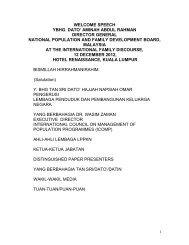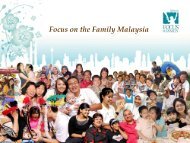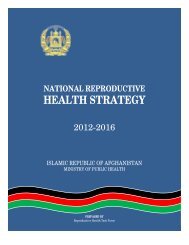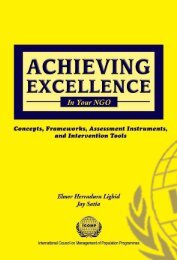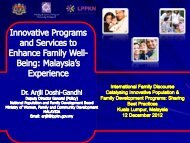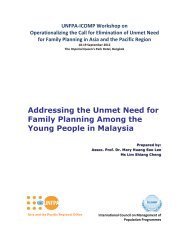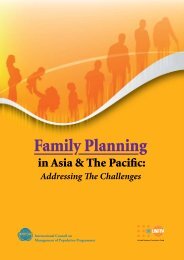SRH and HIV/AIDS Linkages at Policies, Programmes and Service ...
SRH and HIV/AIDS Linkages at Policies, Programmes and Service ...
SRH and HIV/AIDS Linkages at Policies, Programmes and Service ...
Create successful ePaper yourself
Turn your PDF publications into a flip-book with our unique Google optimized e-Paper software.
ut all sources have consistently spenthighest on prevention, care <strong>and</strong> support.Spending on programme management<strong>and</strong> administr<strong>at</strong>ion needs careful <strong>and</strong>cautious interpret<strong>at</strong>ion; a detailedbreakdown of expenditure is necessaryto be able to draw conclusions. As thefinancing of n<strong>at</strong>ional response is heavilyreliant on intern<strong>at</strong>ional funding, so is themanagement of funds. In other words,a large proportion of available fundsis managed (or spent) by or throughmultil<strong>at</strong>eral agencies <strong>and</strong> INGOs.2. Systems2.1 PartnershipsIn Bangladesh partner organis<strong>at</strong>ionson <strong>SRH</strong>R rel<strong>at</strong>ed issues are mainlyfrom Sweden, working closely withthose from the Netherl<strong>and</strong>s (EKN),DFID, WHO, <strong>and</strong> UNFPA. Swedensupports the sector programme inhealth where donors give their supportto the government via the World Bank.An example is the Urban PrimaryHealthcare Programme (UPHCPH)which is supported by Sweden via ADB,together with DFID <strong>and</strong> UNFPA.Development partners have beenplaying a significant role in theprevention <strong>and</strong> control of <strong>HIV</strong> inBangladesh, building the capacity ofgovernment to plan, design, implement<strong>and</strong> monitor the n<strong>at</strong>ional <strong>HIV</strong>programme. Development partners arefrom multil<strong>at</strong>eral bodies such as UNagencies, bil<strong>at</strong>eral donors, intern<strong>at</strong>ionalNGOs, <strong>and</strong> n<strong>at</strong>ional <strong>and</strong> intern<strong>at</strong>ionalresearch organis<strong>at</strong>ions such as IEDCR<strong>and</strong> ICDDR,B respectively. Theexisting <strong>HIV</strong> interventions are mainlysupported by USAID (through FHI),GFATM (through Save the Children-317



